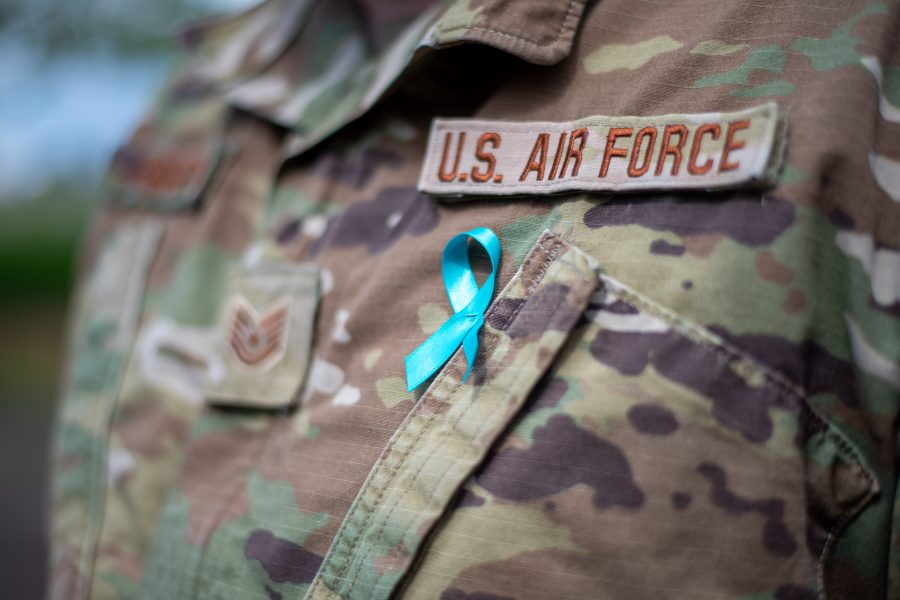Sexual assaults in the U.S. military decreased for the first time in nearly a decade last year, according to a new survey—but the Defense Department still faces deep mistrust among many women service members in how it handles cases.
“We know we have a lot more work to do to rebuild trust, especially amongst our servicewomen,” Beth Foster, the executive director of the Pentagon’s Office of Force Resiliency, told reporters.
The DOD puts out a yearly accounting of reported sexual assaults, but the biannual, anonymous survey of sexual assault prevalence, released May 16, is seen as a far better indicator of actual incidents because sexual assault is dramatically unreported in both military and civilian life. Officials said reported cases were just a quarter of the total estimate of sexual assaults involving a service member in 2023.
Overall, roughly 29,000 troops said they were sexually assaulted in fiscal 2023 in the anonymous survey, a 7,000-person decrease compared to the 36,000 in 2021. The Pentagon said the decrease was primarily driven by decreases in estimated cases of sexual assault against women serving in the Air Force—from 5.5 percent to 4.6 percent of female Airmen—and the Navy.
For the first time, the Space Force was included separately in the Pentagon’s survey—an estimated 6.1 percent of female Guardians and 0.6 percent of male Guardians said they were sexually assaulted last year. One percent of male Airmen said they were sexually assaulted in the past year, the same as in 2021.
“Its findings demonstrate that the department is making progress to prevent sexual assault and harassment in the military,” Secretary of Defense Lloyd J. Austin III said in a statement on the report.
An estimated 6.8 percent of Active duty women experienced sexual assault in 2023—approximately a 1.6 percent decrease from 2021. Just over 1 percent of men said they were sexually assaulted, which Pentagon officials said was not a statistically significant change. Among women, the 2023 report still found the second-highest rate of sexual assault recorded since 2006—also 6.8 percent that year. However, the release of the 2023 numbers marked the first time since 2016 that there had been a drop from the prior report.
But while rates were lower, the report found the majority of women surveyed did not have trust in the military’s handling of sexual assault. Just 38 percent of women surveyed trusted the military to protect their privacy if they were sexually assaulted. Service members were also asked if they believed the military could “ensure your safety” and “treat you with dignity and respect” if they were sexually assaulted—only 43 percent of women said yes to those questions, which were asked separately. Those numbers were only slight improvements over 2021, despite a number of efforts in recent years to combat sexual assault in the military. In contrast, roughly two-thirds of men said trusted the military with their privacy and safety if they were sexually assaulted.
“There’s much more to do,” said Nate Galbreath, the acting director of the Pentagon’s Sexual Assault Prevention and Response Office, or SAPR. “We do know that climates of trust, where people can see that victims of sexual assault are treated well when they come forward to make a report often encourage others to come forward and make a report.”
There were 1,838 official reports of sexual assault received by the Department of the Air Force in 2023, a drop of five percent from 2022, a year which had a dramatic rise.
However, “this is the second highest number of reports received since the beginning of the SAPR program” roughly 15 years ago, the Air Force report stated.
The Pentagon has taken steps to improve how it handles sexual assaults. Since the end of last year, independent prosecutors outside service members’ chain of command now handle sexual assault cases, a long-awaited move that is intended to remove bias or potential retaliation from the equation. Pentagon officials said they hoped that would restore troops’ faith that cases would not be swept under the rug.
“Our hope is that we can regain some trust amongst our victims so that they know that their cases are being treated independently and with the professional nature that is required of these crimes,” Foster said.
The Department of Defense has also hired around 1,000 staff to focus on the prevention of sexual assault, with the ultimate goal of hiring 2,500 personnel.
“We’re focused on professionalizing our sexual assault response workforce,” Foster said. “A lot of these folks are performing that role in a collateral duty role, and while they may be very dedicated to that work, victim assistance is a full-time job. We also are focusing on making that workforce independent as well because we know there have been instances in which our service members haven’t trusted the people, the victim advocates, that they need to trust to take care of them because they’ve been aligned with command. And so a lot of those changes are underway, but we know it’s going to take some time before we start to see those numbers shift.”

